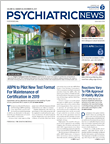Insomnia is a common comorbidity seen in children with autism spectrum disorder (ASD), which exacerbates existing cognitive and behavioral problems. However, no medications are currently approved to treat pediatric insomnia.
A clinical trial has found that a prolonged-release melatonin (PRM) minitablet specially formulated to facilitate swallowing by children is safe and effective at reducing symptoms of pediatric insomnia. The tablet, known as PedPRM, is a smaller version of a drug called Circadin that is approved to treat insomnia in older adults in Europe.
The trial, co-led by Paul Gringas, M.D., M.B.A., the chair of sleep medicine at Kings College London, and Robert Findling, M.D., M.B.A., the director of child and adolescent psychiatry at Johns Hopkins University, enrolled 125 children aged 2 to 17 with chronic insomnia (three months or more) at sites in both the United States and Europe. Of the 125 participants, 121 had a diagnosis of ASD, and four had Smith-Magenis syndrome, an inherited neurodevelopmental disorder characterized by circadian problems. Thirty-six of the participants also had comorbid attention-deficit/hyperactivity disorder (ADHD), and 16 had epilepsy.
The participants were randomly assigned to receive either 2 mg/day of PedPRM or placebo for 13 weeks. After three weeks, patients taking PedPRM who did not show any improvements were escalated to receive 5 mg daily. Parents recorded all sleep and nap data in a diary.
After 13 weeks, the children taking PedPRM slept nearly an hour longer on average than when they started the study, compared with a nine-minute improvement in the placebo group. The time it took participants in the PedPRM group to fall asleep also dropped by about 40 minutes by the study’s end, compared with a 12-minute decrease in sleep latency in the placebo group. In total, 68.9 percent of children taking PedPRM saw a clinical improvement in sleep duration and sleep latency, compared with 39.3 percent of children taking placebo.
The authors also reported that there were no significant differences in sleep improvements among children with or without comorbid ADHD. Likewise, there were no differences when comparing younger and older children.
The large increase in total sleep time is meaningful, the study authors noted. A previous clinical study conducted by Gringas using immediate-release melatonin tablets found that children tended to fall asleep faster, but also wake up earlier, which cancel each other out in terms of benefits. The authors suggested that immediate-release melatonin—the kind available as a nutritional supplement—may promote sleepiness but cause unwanted changes to the sleep-wake cycle.
PedPRM also showed a favorable safety profile with no unexpected safety issues. Adverse side effects were few, with headaches and daytime sleepiness elevated in the PedPRM group relative to the placebo group. Only one child with epilepsy experienced a seizure during the study, and that was in the placebo group. Compliance was also quite high, suggesting the minitablet strategy is an effective one.
The study was funded by Neurim Pharmaceuticals, the manufacturer of Circadin and PedPRM. It was published in the November issue of Journal of the American Academy of Child and Adolescent Psychiatry. ■
An abstract of “Efficacy and Safety of Pediatric Prolonged-Release Melatonin for Insomnia in Children With Autism Spectrum Disorder” can be accessed
here.
